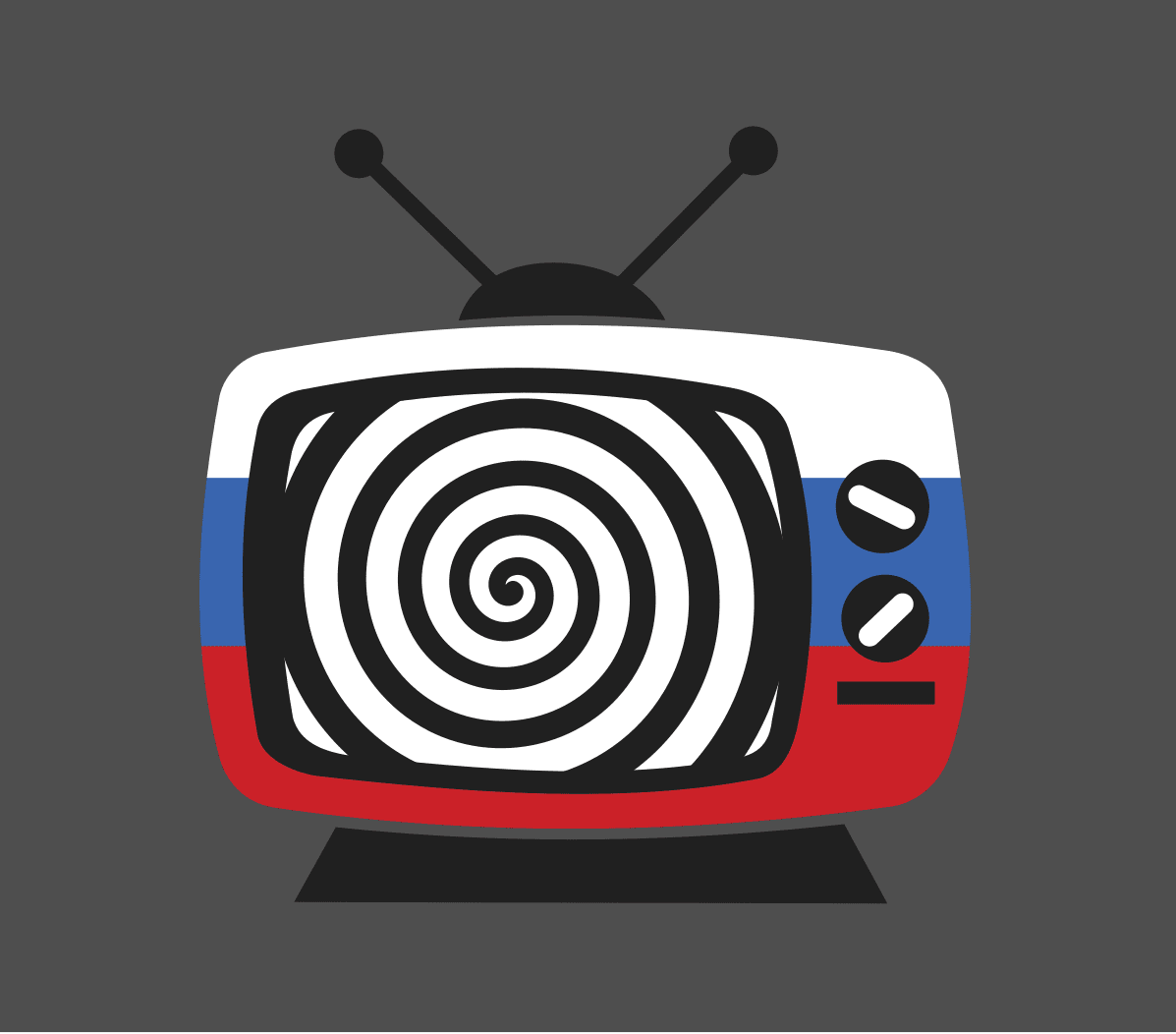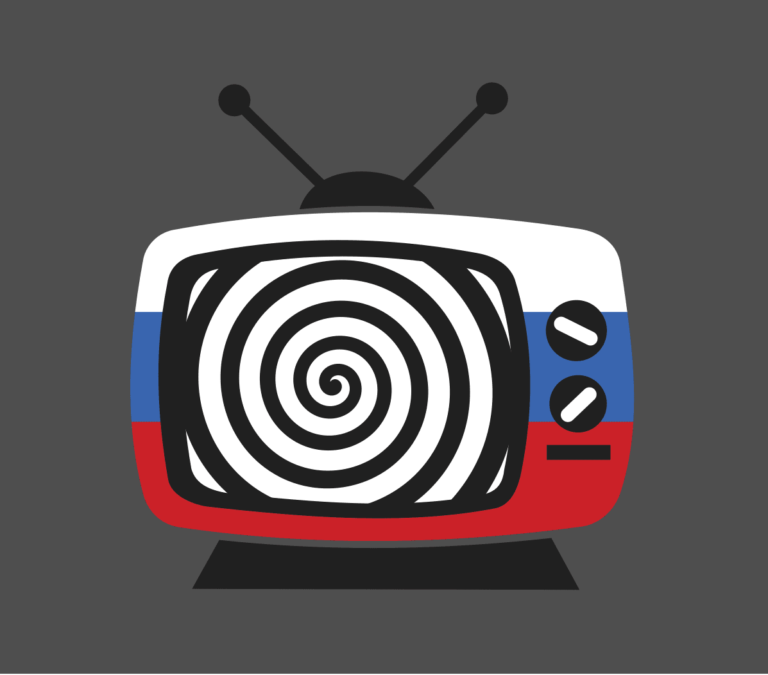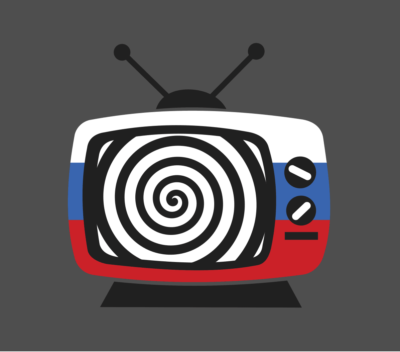by Lóránt Győri, Political Capital
Despite Hungary backing the EU’s punitive sanctions regime against Russia and the humanitarian aid the cabinet provided to Ukraine, the government continues its foreign policy balancing act between the West and Russia.
As a direct consequence, the Hungarian media space dominated by pro-government media does not only limit freedom of the media, but it also creates a Hungarian information “bubble” that legitimises the Russian military aggression against Ukraine to this day, while preventing Hungarians from forming a united front of solidarity with Ukraine above party lines – which ultimately turns Hungary’s information vulnerability to the Kremlin into a shared vulnerability of NATO and the Trans-Atlantic Community.
No country for brave men
15 March marks the anniversary of the Hungarian Civic Revolution and War of Independence of 1848–1849, when our ancestors fought against the Habsburgs and Russian Empire to achieve national independence and establish an independent nation state. Although the revolution was crushed by Austrian and Russian forces, it marked the political and cultural (re)birth of the Hungarian nation, similar to Ukraine’s current fight against Russia. It is no wonder that the Hungarian revolution inspired Ukraine’s ambassador to Budapest, Ljubov Nepop, who had some strong words for the Hungarian political elite in reaction to some arguments that the Kremlin should still be treated carefully due to Hungary’s energy security:
“The anniversary of the 1848 revolution is coming, and they are talking about the utility cost cuts [based on the long-term gas contract between Hungary and Russia]. Isn’t human life important? Do those who put the reduction of utility costs before freedom have the right to celebrate on 15 March? Please, this year only those who have the courage to stand up for freedom should go out to the streets to celebrate.”
Her words reverberated greatly in the Hungarian public, but for not the reasons you would think. On the leading pro-government news site 888.hu, one author would have had the ambassador “driven home from here without her feet touching the ground” for trying to “drag us into the Russian-Ukrainian war.” At the same time, one of the most prominent governmental opinion-leaders, the proud owner of Fidesz’ party membership book No. 5, Zsolt Bayer declared that she should have been expelled within 48 hours for her words and not standing up to past nationalist provocations endured by ethnic-Hungarians during their local 1848 commemorations in Transcarpathia.
One step forward, two steps back
While it is true that the diplomatic relations between Hungary and Ukraine have long been poisoned by the Ukrainian language law severely limiting the use of minorities’ mother tongue in the public education system, the legitimate criticism of Ukrainian minority politics should not divert attention from Hungarian pro-government media’s long-term pro-Russian and pro-Chinese predisposition. The abnormal concentration of media power in the hands of the government, which resulted in the construction of a pro-governmental media empire of more than 500 public or private outlets, or more than 50% of the media market, has not only severely limited the freedom of media in Hungary. It also contributed to a Hungarian media space mostly in line with the government’s domestic and foreign policy agenda. Investigative portal Direkt36 has reported, based on internal documents, that the government’s control over the public news service, the Hungarian News Wire Agency (MTI), parts of the state-run media company MTVA, relies primarily on outright censorship, or manipulation – filtering or altering news items unfavourable for President Putin, Russia or China.
Therefore, it is no coincidence the pro-government media has been praising President Putin or President Xi-Jinping and echoing the success of the so-called Hungarian Eastern Opening Foreign Policy approach for the last twelve years. After the initial shock of the current crisis on 24 February, the Hungarian government capitulated almost entirely on the diplomatic front by joining and supporting Western sanctions. Still, the anti-Ukrainian and pro-Russian communication persisted and took a more elaborate turn to provide some wiggle-room for the government, trying to appear “neutral” in the eyes of the Hungarian public and even more so in Moscow’s.
Propaganda “outsourced”
The pro-government mainstream media adapted to the diplomatic U-turns by employing a double-layered approach: most of the leading pro-government outlets provided a generally fact-based, objective minute-by-minute report on the conflict itself, while pro-Russian narratives were “outsourced” to pro-government institutions and experts publishing opinion pieces or appearing on shows in pro-government media. So, the first few days of the Russian invasion was legitimised by a wide-array of pro-Russian “strategic” or “tactical” narratives disseminated by the pro-government media that either reflected fresh narratives used as pretexts for the war or long-held pro-Kremlin and anti-Ukrainian beliefs of Hungarian opinion-leaders. For example, the foreign policy editor of the main state-run M1 channel declared that “Putin has stepped up to defend the Russian-majority population of Donetsk and Luhansk oblasts.”
An analyst from a pro-government think tank argued on the same channel that if the allegations that Ukraine has committed genocide and wants nuclear weapons are true, then the claim that unilateral acts of war have taken place is questionable. Another expert refined the argument about the alleged “genocide” to expand it to the Hungarian minority living in Transcarpathia:
“Whether genocide, i.e., mass extermination in the classical sense of the word, has taken place is not known, but ethnocide has certainly taken place in recent years, and the Hungarians of Transcarpathia have been the victims of it.”
There was also a suggestion that Washington was actually trying to “disconnect” Ukraine from Russia, and “what Russian President Vladimir Putin says should have been taken seriously earlier, and it is still worth taking seriously,” – said a security policy expert from the Centre for Fundamental Rights on the day of the invasion. Some of the disinformation narratives have been present for quite some time in the pro-government media, as proven by prominent rightist publicist Zsolt Bayer who characterised Ukraine as “a puppet state established and operated by the CIA” in the leading pro-governmental daily Magyar Nemzet at the end of January. Nor it is a transitional phenomenon on the right side of politics, since the leading showman Zsolt Jeszenszky from Pesti TV, which is funded by a pro-government oligarch, disseminated the most recent conspiracy theory about the US-funded biological laboratories in Ukraine on his Facebook page just a few days ago.
As a result, the pro-government mainstream media seemed to produce at least as extreme pro-Russian and anti-Ukrainian narratives during the war in the first few days of the conflict as the small number of pro-Kremlin pages mostly parroting the official line about a simple “military operation” being conducted in Ukraine. Therefore, the dissemination of pro-Kremlin war propaganda has not only not been banned or criminalized in Hungary, such as, for example, in the Czech Republic, it stayed a non-sanctioned, even encouraged or rewarded activity.
Trolls in the shadows
As a third layer of campaign communication, both the government and the opposition rely on so-called “grey zone” media that is made up of mostly anonymous homepages and social media pages with murky organisational, editorial or financial background, directly pushing party-propaganda in the run-up to the 3 April 2022 general elections. When it comes to the war in Ukraine, the pro-government grey zone media have not exercised any constraint whatsoever.
Two of the most significant pro-governmental alternative Facebook sites with over 300.000 thousand followers, the Számok – a baloldali álhírek ellenszere (Numbers – the antidote to left-wing pseudo-news) and the Patrióta Európa Mozgalom (Patriotic European Movement) basically published the word-by-word Hungarian translation of President Putin’s early morning speech on 24 February, legitimising the invasion by falsely accusing Ukraine of various crimes, such as committing “genocide.” The pro-government warmongering has not stopped since, the same media continue to blame the victim for the aggression, while exonerating the Hungarian government’s from any diplomatic role in the conflict:
“NATO’s expansion into the East was a big mistake! The arrogant, Russophobic policy will hurt everyone. (…) Hungary did not finance the bloody unconstitutional coup in 2014 and Hungary is not the author of the anti-Russian sanctions.”
Even if the pro-government mainstream or grey zone media exercised some serious self-control over wartime propaganda, the Hungarian pro-Kremlin troll’s apparatus became activated as a part of the conflict. Recent research of Political Capital surveyed more than 6000 Facebook comments published about the war in the first few days of the conflict that revealed real and fake-looking profiles starting to disseminate the same comments using the copy-and-paste technique. These examples include one of the posts of the leading pro-Kremlin site of Orosz Hírek (Russian News) about Ukraine “murdering its own people,” and preventing ethnic Hungarian from using Hungarian in schools or everyday conversations, which was directly shared over 4000 times, and re-posted as a comment several dozen times under articles reporting on the opposition’s protest in front of the Russian Embassy in Budapest, articles of Euronews, Telex etc.. To make matters worse, the outlets of the pro-government grey zone also started re-posting the same message about the ”junta in Kyiv” on Elemi.hu, Hirextra.info or Napi Újság.
The Kremlin’s fifth column
The infiltration of the Hungarian far-right subculture and extremist organisations by Russian intelligence operatives and services is a well-documented fact in Hungary. It originally started with a “businessman” named Béla Kovács, who around 2004-2005 joined and financed the former far-right party Jobbik, only to become its MEP in 2009. Béla Kovács was charged with espionage against the European Union by the Hungarian authorities in 2014, and left for Moscow in 2021 after being cleared of the charges, despite evidences that he had been in regular contact with members of the Foreign Intelligence Service of the Russian Federation (SVR). Kovács’ wife was a personal acquaintance of the head of the now disbanded paramilitary group Magyar Nemzeti Arcvonal 1989 (Hungarian National Front 1989), whose members trained together with Russian military intelligence (GRU) in the Hungarian countryside up until 2016.
The Russian connections of the extremist scene was in plain sight again in 2021, when former politicians of the Jobbik party took part in an “elections observation mission” organised by pro-Kremlin figures – such as Kovács Béla’s Polish friend Mateusz Piskorski, who was similarly investigated for espionage by the Polish authorities – to legitimise the re-election of a pro-Kremlin politician, President Faustin-Archange Touadéra in the Central African Republic. Thus, it is no wonder that the current far right and neo-Nazi party, Mi Hazánk Mozgalom (Our Homeland Movement) composed of the former, more extremist figures of Jobbik took Russia’s side in the conflict.
MPs of the party either tried to push the narrative about the need for Hungary to remain “neutral” and reject the stationing of additional American troops on the Hungarian territory in the current conflict, or advocated for a soft territorial revisionism against Western Ukraine. Party leader László Toroczkai has reiterated the Kremlin’s claims on many occasions about Ukraine “not having a right to exist,” or having been put together with the “donations of Polish, Russian and Hungarian territories,” which would allow for the redrawing of borders and “settling the status of Transcarpathia” that once belonged to Hungary.
It is more of a shock that the new antivax movement established by a small ring of health professionals and alternative medicine businessmen has put its weight behind the Kremlin. It was evident that the new movement had been adopting pro-Kremlin and pro-Chinese conspiracy theories about the epidemic to bolster its popularity and tap into the societal base of the Our Homeland Movement, which resulted in a quick expansion and anti-US radicalization of the around 100.000-strong new movement, led by a former pharmacist-turned-bodybuilder Dr. György Gődény. His new antivax party called the Party for Normal Life (Normális Élet Pártja) has clearly become another extremist Russian asset by declaring in an unexpected statement:
“We are in favour of a military pacification of the region, even by the Russian side, as long as it is aimed at (…) minimising the suffering of the Ukrainian population and sparing the country’s infrastructure. (…) We condemn the fact that the Atlantic bloc, with its expansion and the deployment of new and newer weapons systems, continues to provoke Russia.”
One bubble to rule them all
What makes the pro-Kremlin communication in Hungary a long-term vulnerability for the country, the region and the Euro-Atlantic Community is the huge information bubble created by the Hungarian government’s media empire – to an extent similar to Russia. According to polls, independent and mostly online news media sites are primarily consumed by younger generations and the middle-class living in the capital or larger cities, which leaves the older, less educated, lower-income individuals or households living in smaller towns or villages exposed to mostly governmental propaganda. If somebody only read pro-government media, they would become convinced that Ukraine deserved its fate for treating Hungarian or other minorities badly for years, and the real culprits for the war are Brussels because it launched unilateral sanctions, making Hungarians pay more for energy, or the opposition who would like to start a war with Russia by sending troops and ammunition directly into Ukraine. In contrast, the Hungarian government is the only sane and cool-headed actor in Central and Eastern Europe by stonewalling Western or regional demands for further escalation of the conflict, not sending armaments into Ukraine, and refusing to condone energy boycott of the Russian Federation – in the name of Hungarian interests.
All the pro-Kremlin communication of mainstream, grey zone, extremist actors, and trolls are hard to escape in this bubble, which makes the Hungarian societal support provided for Ukraine or Euro-Atlantic Community hard to maintain in the long-term. Moreover, as the conflict continues, refugees overwhelm societal capacities and the “price of the war” will be felt economically, pro-Kremlin or anti-Ukrainian narratives might prevail for millions of people, which would then translate into a real vulnerability of the EU and NATO in terms of the region’s long-term security and stability. According to a 2018 Median poll, the hostile propaganda does its job, 51% of Fidesz-voters would have preferred closer connections with Moscow than with Washington at the time. When it comes to the current war, only 44% of Fidesz voters consider the military action an act of aggression, as opposed to 90% of opposition voters, while 25% in the Fidesz camp blame Ukraine for the conflict – measured Publicus.
Lóránt Győri is a geopolitical analyst at Political Capital. He is a sociologist and political analyst, with a masters in social sciences from Eötvös Loránd University, Budapest, where he is currently continuing his PhD studies. His research interests include geopolitics, new media, network analysis, discourse analysis, and science-, youth- and urban sociology. His analysis is focused on current Russian influence in Europe, and he is co-author of several studies on this topic.
The views and opinions expressed on our blog are those of the authors, representing a wide range of viewpoints, and do not necessarily reflect the position of VSquare or our affiliated organisations.







